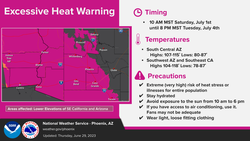Latest News
Back to Articles
Excessive Heat Warning—Take Action! An Excessive Heat Warning is issued within 12 hours of the onset of extremely dangerous heat conditions. The general rule of thumb for this Warning is when the maximum heat index temperature is expected to be 105° or higher for at least 2 days and night time air temperatures will not drop below 75°; however, these criteria vary across the country, especially for areas not used to extreme heat conditions. If you don't take precautions immediately when conditions are extreme, you may become seriously ill or even die.
Heat Sensitive Groups
- Primarily heat sensitive or vulnerable groups, especially those without effective cooling or hydration, or those not acclimated to the level of
- The elderly and the very young.
- Those on certain medications and/or those with preexisting conditions which make them more sensitive to heat (your doctor can let you know if this is you).
- Those working outdoors -- especially new workers, temporary workers, or those returning to work after a week or more off.
- Those exercising or doing strenuous activities outdoors during the heat of the day - especially those not used to the level of heat expected, those who are not drinking enough fluids, or those new to that type of activity.
- Those without a reliable source of cooling and/or hydration.
- Those not acclimated to the level of heat expected - especially those who are new to a much warmer climate.
For those at risk, the following actions can be taken:
- Stay hydration.
- Reduce time spent outdoors or stay in the shade when the sun is strongest or Strongly consider canceling outdoor activities.
- Dress for the heat - lightweight and light-colored clothing.
- Stay in a cool place, including overnight.
- If you have access to air conditioning, use it, or find a location that does. Even a few hours in a cool location can lower risk. Fans will not be adequate.
- Check on your neighbors.
Recognize the signs and symptoms of heat-related illness. Early signs include thirst and muscle cramps.
Heat exhaustion may include: cool, moist, pale skin; headache; dizziness; weakness or
exhaustion; nausea.
The most serious illness is heat stroke, which may include: vomiting; confusion; throbbing headache; decreased alertness or loss of consciousness; high body temperature (above 105F); hot, dry skin; rapid, weak pulse;
Heat stroke can be DEADLY. Treat as an emergency and call 911.
General Care for Heat Emergencies
General care for heat emergencies include cooling the body, giving fluids, and minimizing shock. For specific heat-related emergencies, follow these steps:
- For heat cramps or heat exhaustion:Get the person to a cooler place and have the person rest in a comfortable position. If the person is fully awake and alert, give a half glass of cool water every 15 minutes. Do not let him or her drink too quickly. Do not give liquids with alcohol in them, as they can make conditions worse. Remove or loosen tight clothing and apply cool, wet cloths such as towels or wet sheets or mist with water. Get the person into an air conditioned space if possible. Call 9-1-1 or the local emergency number if the person refuses water, vomits or loses consciousness.
- For heat stroke:Heat stroke is a life-threatening situation! Help is needed fast. Call 9-1-1 or your local EMS number. Move the person to a cooler place. Quickly cool the body using any means available, including cool water and ice. If you have ice packs or cold packs, wrap them in a cloth and place them on each of the victim's wrists and ankles, in the armpits and on the neck to cool the large blood vessels. (Do not use rubbing alcohol because it closes the skin's pores and prevents heat loss.) Wrap wet sheets around the body and place the person in front of a fan or air conditioner. Watch for signals of breathing problems and make sure the airway is clear. Keep the person lying down.




